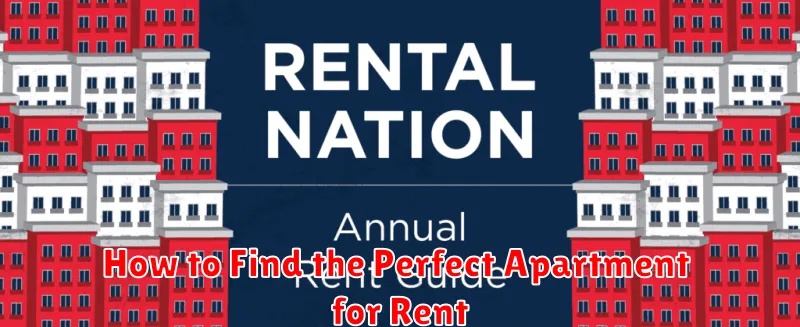Finding the perfect apartment for rent can be a daunting task, but with careful planning and execution, it can be a rewarding experience. This comprehensive guide will provide you with the essential tools and knowledge to navigate the rental market effectively. Whether you are a first-time renter, a seasoned tenant, or relocating to a new city, understanding the process of finding your ideal apartment is crucial. From defining your budget and desired amenities to understanding lease agreements and tenant rights, this article will empower you to make informed decisions and secure the perfect apartment for your needs.
Locating the ideal rental property requires a strategic approach that encompasses several key factors. This article will cover various aspects of the apartment hunting process, including how to effectively search for apartments for rent using online platforms and local resources. We will explore the importance of considering factors like location, size, pet policies, and parking availability. By understanding these critical elements, you will be well-equipped to find an apartment for rent that perfectly suits your lifestyle and preferences. We will also discuss the crucial steps involved in preparing a strong rental application and ensuring a smooth move-in process. This guide is designed to help you find the perfect apartment that truly feels like home.
Determining Your Budget
One of the most critical steps in finding the perfect apartment is determining your budget. Knowing how much you can comfortably afford will help narrow your search and prevent you from falling in love with a place outside your price range.
Start by calculating your monthly income and expenses. Common expenses include groceries, transportation, utilities, and existing debts. A general rule of thumb is to allocate no more than 30% of your gross monthly income towards rent.
Consider additional costs like security deposits, application fees, and pet fees. These can add up quickly, so factor them into your overall budget.
Choosing the Right Location

Finding the perfect apartment goes beyond just the unit itself; its location is paramount. Proximity to work or school can significantly impact your daily commute and overall quality of life. Consider the neighborhood’s safety and amenities. Are there grocery stores, restaurants, and parks nearby?
Think about your transportation needs. Is public transportation readily accessible? If you rely on a car, is parking readily available and affordable? Research local crime statistics and consider visiting the neighborhood at different times of day to get a feel for the area.
Inspecting the Apartment Condition
Once you’ve found a promising apartment, a thorough inspection is crucial. Don’t rely solely on photos. Schedule an in-person visit to assess the condition firsthand.
Pay close attention to the plumbing. Check for leaks, water pressure, and proper drainage. Look for signs of water damage, such as stains or mold. Inspect the electrical system. Ensure outlets work and there are no exposed wires.
Examine the walls and floors for any damage. Note any needed repairs. If possible, check the heating and cooling systems to ensure they function correctly. Finally, consider the overall cleanliness of the unit.
Evaluating Amenities and Facilities
Once you’ve narrowed down your apartment search based on location and budget, it’s time to carefully evaluate the amenities and facilities offered by each prospective property. These features can significantly impact your quality of life and overall rental experience.
Essential amenities like laundry facilities, parking, and security systems should be at the top of your checklist. Consider your lifestyle and prioritize amenities accordingly. For example, if you enjoy fitness, an on-site gym might be crucial. If you work from home, reliable internet access and a dedicated workspace within the apartment could be essential.
Inspect the condition of these amenities. A sparkling pool is useless if it’s closed for maintenance half the time. Similarly, a laundry room with broken machines is a major inconvenience. Ask questions about maintenance schedules and the responsiveness of management to repair requests.
Reading and Understanding Rental Agreements
Before signing, carefully read the entire rental agreement. Understanding the terms and conditions is crucial to avoid future disputes.
Pay close attention to the lease term, rent amount, and due date. Also, note any penalties for late payment.
Security deposit details, including the amount and conditions for return, should be clearly stated. Understand your responsibilities regarding maintenance and repairs.
Be aware of any restrictions on pets, guests, or alterations to the property. If anything is unclear, seek clarification from the landlord or property manager before signing.
Negotiating the Rental Price
While the advertised rental price is a starting point, it’s often negotiable, especially in a renter’s market. Researching comparable properties in the area will give you leverage during negotiations. Understanding the average rent for similar units allows you to present a reasonable counteroffer if you believe the listed price is too high.
Be prepared to justify your proposed price. Highlight any drawbacks of the unit or building amenities compared to similar apartments with lower rents. Politely and respectfully present your case, emphasizing your reliability as a tenant, such as a steady income and good credit history. Negotiating rent demonstrates your proactive approach and can lead to significant savings over the lease term.
Checking Safety and Security Features
Safety and security should be top priorities when choosing an apartment. Thoroughly inspect the potential unit and surrounding area for these crucial features.
Look for well-lit common areas, secure entry points with functioning locks, and working smoke detectors. Consider the presence of security cameras, an intercom system, and the overall condition of doors and windows.
Inquire about the building’s security measures, such as on-site personnel or regular patrols. A safe neighborhood contributes significantly to your peace of mind. Research the area’s crime statistics and consider factors like proximity to emergency services.

